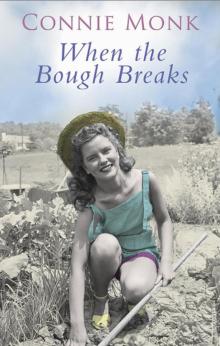- Home
- Connie Monk
The Fleeting Years Page 8
The Fleeting Years Read online
Page 8
The twins had been away at school more than three years on a morning when Jenny was feeling more depressed than she was prepared to admit. A click of the letterbox told her, just as it did each morning, that the paper had arrived.
There were times when she longed to do something wildly different and she was never more aware of it than when she stooped to pick up the newspaper. What have I let myself turn into? Friday morning and the daily monotony is broken because there is not just the daily but the weekly rag as well. ‘Jolly hockey sticks!’ She said it aloud, the sneer in her tone plain to hear, then back in the kitchen threw both newspapers onto the table and turned to pour her breakfast coffee. What should she do this morning? Mrs Morris would be in at half past nine … ‘Friday, bedrooms today,’ she would say as she stepped inside the house, ‘with only the one been used I’ll have time to give the windows a shine too.’ Bedrooms, landings and stairs, drawing room, dining room, Alice Morris took pride in her work and kept to a strict routine. This morning Jenny knew she was being a coward, but she decided to escape. It was too early yet, but later she would drive over and see Zina. Friday and the quintet were playing at Dricombe this evening, only an hour’s drive away so she wouldn’t leave until well into the afternoon. Of course, his lordship wouldn’t grace the house with his presence this weekend (Jenny didn’t consider that he might not even be free; in today’s dispirited mood she preferred to think the worst of him). Pouring her coffee she took it to the kitchen table, but still her thoughts ran away with her. ‘It’s not fair on her,’ she muttered, then took a gulp of too-hot coffee and put the cup back on her saucer with a clatter. ‘Not that Zina tells me, but I’m not blind. He doesn’t like it if she can’t give him all her attention. Suppose he hadn’t been “discovered” or whatever they call it, suppose he’d still been in that rep company, he would have been glad enough for her to work then. Why are some men so arrogant? Not you, Richard, you never were. For more than five years you’ve been gone. Shall I ever get used to being by myself? It’s not just missing you, the way we always talked about everything we read in the papers, the way we laughed at the same jokes, listened to the same music, yes of course I miss you for all that and for everything that you were – that we were, because now that you’re not here I know I’m not the person I used to be, I spend my life dashing around filling the hours, trying to pretend any of it matters; but it’s the pointlessness of everything now that you’re gone. Alice Morris will come in here this morning full of vim and vigour, looking forward to making the bedrooms shine. I ought to be ashamed. She’s been a widow for years and she still has a purpose. She’ll work her butt off this morning, and for what? Just for me to shut the door on the clean rooms for another week. There’s no point in any of it. That’s what I can’t get used to. I go to town and make myself try on clothes, buy something pretty as if it matters like it used to when we were together. But what’s the point? I go to local meetings, and what a charade it all is.’
Picking up her fast-cooling coffee she drank it down like a thirsty man in a four-ale bar, then with new determination washed the cup under the running tap. She was ashamed. How could she sit there grizzling when it was such a beautiful morning? She’d mow the grass, then she’d have an hour pulling up weeds. By then it would he nearly lunchtime and she’d drive over and drop in on Zina. With the morning planned she was able to greet Alice Morris with her usual smile and then set about getting prepared to spend her morning outside.
If there was one thing geared to raise her spirits it was working out of doors. There had been rain in the night (enough rain that reason told her she ought to leave the grass and concentrate on the weeds while the ground was soft, but she was in no mood to listen to reason). The morning sky was a clear blue with not even a wisp of cloud. As soon as she pulled the starter of the motor mower and took her first steps up the large rectangular lawn she was lifted from that cloud of depression. She walked the length of the lawn, then back, then up again, back, up, with each step getting more satisfaction out of what she did. It was nearly an hour later when she heard the garden gate. She didn’t stop, expecting it would be Zina and imagining that she would take the shears and trim the edges. But when there was no familiar ‘Hi Mum’ she assumed it must have been someone putting a leaflet through her front door. So on she went, keeping a steady pace, up the lawn, back again, then turning to continue, concentrating on keeping the lines straight and imagining the tennis court that used to be marked out here each summer in what seemed like another life. It was as she turned to start another row that she heard a step on the path and cast a quick glance over her shoulder.
The man coming up the path by the side of the house was a stranger. And yet, was he? For a moment she couldn’t think why he was familiar, and then it dawned on her.
‘Why surely it’s Mr Masters? Is something wrong?’
‘I regret you have the advantage. Would you be Zina’s mother? She has mentioned to me that you have sometimes come to recitals, but we have never met.’ His manner was very formal, made with a courteous bow of the head, the action teasing the back of her mind with something she couldn’t bring to the fore. Then in a completely different tone, as if his words were spoken spontaneously before he had a chance to hold them back, he said, ‘Until this minute I’d never connected you with the lady with a stubborn petrol cap – but that was so long ago that you will have forgotten.’
Switching off the motor on the mower she came towards him, her laugh completely natural. ‘That’s it! When I turned and saw you I recognized you from the recitals, and even while I’ve been watching you play I’d always had a niggling feeling I’d seen you somewhere before.’ Then with a chuckle, she said, ‘Sir Galahad of the petrol cap – an incident I’d tried to brush out of my memory.’ She held out her hand to him, thinking how different he looked in corduroys and an anorak rather than the evening suit he wore for recitals. ‘Were you hoping to find Zina here? How did you know where I live?’
‘Yes to the first question, but the second wasn’t as simple. I knew you were somewhere in the village here, she had mentioned it, but I didn’t know your name. However, in a village nothing is secret. I asked the butcher if he could tell me where I would find Zina Marchand’s mother.’
‘I’m sorry but she isn’t here. You’ve been to Newton House?’
‘No reply there – and her phone seems out of order. I reported it to the telephone people before I left home. You’ve not heard the regional news this morning I take it?’
‘No, is there something special? News is seldom the kind to lift the spirit so I wait until six o’clock. Why do you ask?’
‘A big fire last night in Dricombe. The Victoria Hall where we were booked to give a recital this evening was gutted. I heard it at seven this morning and I’ve got messages to the others, but couldn’t get through to Zina so I thought I’d better come and give her the news myself.’
‘Was anyone hurt do you know?’
‘I imagine not, I’m sure if there had been injuries they would have reported it. Apparently the alarm was raised in the early hours but the fire had a hold on the property by that time.’
‘Sad. A local hall like that can be the hub of the village. I know here the village hall is where every local event is centred.’ Then pulling her thoughts back to the reason of his call, she added, ‘I don’t expect Zina’s far afield. I had intended to drive over to see her later in the morning when I’d dealt with the grass. It’s the mother instinct, you know,’ she added with a laugh patently aimed at herself, ‘I thought if I turned up about lunch time she would be bound to eat something before she set off. It’s such a temptation not to bother preparing food just for yourself. I imagine she must be planning to get on the road in good time for you to be able to run through the music together before you all get dolled up for the evening.’
He’d thought of the ‘petrol cap lady’ so often since that day when he had found her at the garage. It made no sense, but he felt it was like meeting an
old friend.
‘Somehow I must stop her making a fruitless journey. Would you have any idea where she may be? The hairdresser perhaps? There was a chap working in the garden but he said he hadn’t seen her today.’
‘I doubt he would have. They leave him to organize himself. Neither Zina nor Peter are gardeners – although when I heard the gate this morning and thought it was probably her, I had the idea I might get her to do the edges with the shears.’ Immediately she wished she could withdraw her words. Would he think she was waiting for him to offer? Clearly she could remember how he had protected his hands when he undid her petrol cap.
She needn’t have been embarrassed; he made no such offer.
‘Go indoors and help yourself to the telephone,’ she suggested. ‘Through the kitchen into the hall, then it’s the first door on the right. If you reported her phone was out of order at the start of day, you never know, by some miracle it might be working again. Sometimes it can be a fault that doesn’t need a home visit. Mine was like that a couple of weeks ago and they sorted it out almost immediately. Now I’ve started I want to get this cut, but the edging can wait until tomorrow.’
But it worked out quite differently. Zina arrived while he was indoors hoping for better luck with a second call. Suddenly the mood of the morning changed for all three of them. Derek Masters had left his apartment feeling less than pleased that while the other members of the quintet had been contacted by telephone, he was faced with a thirty-mile journey to find Zina. Then reaching her home only to find she wasn’t there had done nothing for his good humour. So he’d made his way to Myddlesham, remembering that that was where she had mentioned her mother lived. That he had been so out of humour by the time he drew up at her gate was completely unsuspected by Jenny, just as was her earlier fit of the blues unsuspected by him. How could he be disgruntled when his morning had brought him face-to-face with the petrol cap lady? That alone would have raised his spirits, but the sight of her in well-worn and patched slacks with a check shirt many sizes too large (presumably her late-husband’s), sleeves rolled up, for if they hadn’t been, all hint of her having hands would have been lost, was enough to drive every other thought from his mind. His greeting had been formal and courteous, giving no sign of what was going on in his mind. But before more than the first sentences had been spoken he was as relaxed as Jenny was herself.
‘Still no reply,’ he called as he came back from the house, hardly expecting to be heard above the noise of the mower as Jenny marched up the last strip to be cut. Then he saw Zina emerge from a shed bearing a pair of shears. She came towards him smiling a welcome. ‘Thanks Derek, Mum tells me you reported my phone. So we have a day off. I just suggested to Mum that you both come back to the house with me when I’ve trimmed these edges, then I’ll rustle up some lunch.’
He felt he was being swept along on a current too strong to be resisted, even if he’d wanted to. The day was young, the recital cancelled and the sun shining. Perhaps the petrol cap lady had other arrangements, although – and a smile tugged at the corners of his mouth – she was hardly dressed for socializing.
‘There!’ Jenny switched off the motor regarding her efforts with satisfaction. ‘Now then, Zina, did I mishear you or were you inviting us to lunch? What do you say, Mr Masters? Can you spare the time? You’ve come a long way, you deserve a break before you set off again. Give me ten minutes to get the garden off me.’
‘As Zina says, this is an unexpected day of freedom. May I suggest that you allow me to take you both out somewhere.’
‘What a lovely idea,’ Zina replied and beamed with pleasure, ‘isn’t it, Mum?’
‘You know what?’ Jenny told them, ‘this morning I got up with a fit of the miseries; really had a black dog on my back. Now you’ve chased it right away. An unexpected treat – what could be better? Are you sure you want to add even more miles to your day, Mr Masters?’
‘Indeed I am,’ he asserted in his formal way and not for the first time it struck Jenny there was something in his manner not quite English. ‘But there is one thing on which I insist: my friends use my Christian name, Derek, and I should be honoured if you would consider me to be your friend.’ Then bestowing a smile on Jenny (a smile Zina privately saw as uncharacteristically flirtatious), he added, ‘And would it not be in order for me to address you as something other than “Zina’s mother”?’
‘I’m so sorry,’ Jenny laughed, ‘I knew your name, I forgot you didn’t know mine. ‘I’m Jennifer Beckham – just Jenny.’
He held his hand out to her and, enjoying herself enormously, she grasped it.
‘How do you do, my friend Jenny.’
It is ridiculous, she told herself, as she hurried away to get tidy for the outing. Here I am, nearer sixty than fifty, but I feel as excited as a sixteen-year-old being asked for her first dance. Ridiculous or not, I’m going to squeeze every bit of joy out of the unexpected turn of the day. In future, if the recitals weren’t too far away, she would go to hear the music just as she had previously, but she was unlikely to talk with him on those occasions any more than she did with Zina. She always bought her ticket beforehand, went straight to her seat and left as the audience crowded out as soon as it was over.
Today was something quite different, she wanted every hour to impress itself on her so that she could relive it afterwards. Perhaps she was extra buoyed up by the contrast between now and how she had felt earlier. Little more than ten minutes later she rejoined the others who had given up on trimming the edges and were coming away from the shed having put mower and shears away. In well-fitting trousers and a short-sleeved checked shirt, with her face washed and made-up enough to make her look groomed but natural, she made a delightful picture.
‘Where to, my friend Jenny, coast or country?’
‘There’s a pub on Exmoor where the food is reliably good and the views enough to take your breath away. It’s always been a special place. Would that be too far?’
‘Today is holiday, we shall not be watching the hands of the clock. First we will follow Zina home so that she can leave her car, then we will all travel together.’
Perhaps she would look back and remember it afterwards as more than just a bright patch in a dull grey life.
Four
If Zina imagined that Jenny needed her to bridge the gap between herself and Derek Masters, she very soon realized her mistake. At rehearsals, Derek was always pleasant, good to work with, consistently keeping a friendly distance between himself and the other members of the quintet. Away from the environment of music, she had never thought about him, so she was surprised by the sound of the easy chatter in the front of the car – surprised by him and by her mother too. With the windows half open there was too much wind and tyre noise for her to join in their conversation or even to keep up with what they found to talk about, but she was aware just how long it was since she had heard her mother’s tone so animated.
‘Not much further and we take the lane to the right. We’re almost there,’ Jenny was saying to Derek, turning her head towards the back of the car so that Zina felt herself included, and sounding as excited as a child catching the first glimpse of the sea after a long journey.
‘Be it on your head if the only thing they can provide on a Friday is bread and cheese,’ Derek answered, his voice suggesting that his pleasure was as great as hers.
Watching them and half hearing what was said made Zina wish she hadn’t accepted Derek’s invitation, certain by now that she had only been included because he could hardly have done less. When they drew into the car park of the ancient inn on the moor, she had her excuses ready. Outside was a blackboard on which the day’s menu had been chalked.
‘We’re really too early to eat,’ she said. ‘Mum, why don’t you and Derek choose what you want and give yourselves time for a walk? It’s only just gone twelve and food won’t be ready until nearer one.’
‘Oh but you’ll walk too,’ Jenny said, her tone wavering between a statement and a q
uestion.
‘In these shoes? Not likely. I ought to have thought and changed them when I dropped the car off. But tell me what you want ordered and I’ll go in and chat to our old friend while I have a drink and tell him you’ll be back – when? Shall I say one o’clock?’
Was she imagining it or did she read relief in Jenny’s expression? Certainly neither of them tried to make her change her mind and watching them set off she was conscious of an unfamiliar feeling of anger? Or was it disbelief? Whatever it was, even before she’d got inside the familiar inn it had been replaced by shame and irritation on Jenny’s account. How could a woman of her age, a widow after a long and happy marriage, be so stupid? She was behaving like a teenager setting out on her first date. Even when she was younger, Zina thought, I never remember seeing her look at Dad like she was looking at Derek. If he’d been the sort of man who chased after women and played them at their own game, it wouldn’t be so bad, but his work was his whole life. He must be laughing at her. That he’d suggested the trip at all was surprising, but if Mum is as desperate as all that for a male friend she’ll find she’s wasting her time on him. (And of course she wasn’t desperate; why, her days were more full than most people’s, always dashing around doing things in the village.) It was humiliating to watch her.
Once inside the lounge bar of the inn, her spirit took an upward turn. It meant nothing to Bert Saunders, the landlord, that she was the wife of a screen idol; he hadn’t visited a cinema for thirty years and remembered her as the little girl who had come walking with her parents and been too young to be allowed inside the bar.
‘On your own today, Zina? Nothing the matter with your mother, I hope?’
‘Not a thing, she’s fine. She and a friend are walking up an appetite but I wasn’t prepared; high heels weren’t designed for the moor. I’ll order for the three of us, they said they’d be back here by about one o’clock. We’ll all have the same: Mrs Saunders’ steak and kidney pie.’

 The Healing Stream
The Healing Stream The Fleeting Years
The Fleeting Years Full Circle
Full Circle When the Bough Breaks
When the Bough Breaks